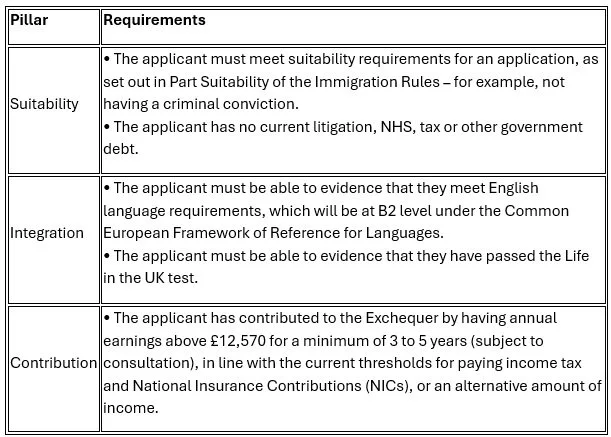Home Office Consultation on Earned Settlement
Written by Imogen Simpson
The Home Secretary has now opened a public consultation on significant changes to Settlement requirements across various visa categories which could lengthen how long many migrants must wait before securing Settlement (also referred to as Permanent Residence or Indefinite Leave to Remain (ILR)). The proposed changes were first announced in the Government’s Immigration White Paper earlier this year (see our blog post here) and the consultation will run until 12 February 2026, with a plan to implement any changes from April 2026. As the proposals are in the consultation stage, they are not in force yet and subject to change in the final legislation.
Who Will Not Be Affected
The Home Secretary has confirmed that some groups are explicitly outside the scope of the reforms:
Spouses, partners and children of British citizens and BN(O)s;
People with Settled Status under the EU Settlement Scheme;
Windrush Scheme applicants;
Serving members of HM Armed Forces and their families; and
People already holding Settlement.
Note: there is indication that parents of British citizen children who are on the five-year route to Settlement will also be outside of scope, but that the changes could affect parents on the 10-year route.
The consultation specifically asks whether bereaved partners, domestic abuse victims, children and young adults, and adults needing long-term care should be exempt.
Three Key Proposals
Before we go into the key changes below, it’s important to note that the Government is proposing that these changes will apply retrospectively to existing visa-holders who entered the UK from 2021 onwards – this is a very unusual step, as changes normally only affect new entrants to the visa category. If implemented retrospectively as proposed, we would expect to see this challenged in the courts.
1. Baseline Settlement Period Increased to 10 Years
Other than the categories which are being excluded, it is proposed that there will be a baseline 10-year qualifying period before an applicant can apply for Settlement. The long-residence (10-year lawful stay) route would be abolished, meaning those who are currently eligible for Settlement under this route should consider applying as soon as possible. Dependants would face separate Settlement timelines, no longer tied to the main applicant.
When applying for Settlement, there would be minimum requirements which must be met (most of which are not new, but importantly an income requirement is being suggested which could particularly impact dependant partners):
In addition, some reductions to the baseline 10-year period may be earned through salary, integration or volunteering - some of these reductions would allow migrants to qualify for Settlement after three years (quicker than the current five year route):
The model also includes penalties which could extend the time to reach Settlement dramatically. In some scenarios, applicants could face waits of 20–30 years or more:
2. 15-Year Settlement Period for Lower-Skilled Sponsored Workers
Under the proposed changes, Skilled Workers in roles below RQF Level 6, including most Health and Care Visa holders, would see their qualifying period for Settlement rise to 15 years. This follows the changes earlier this year to increase the skill level for Skilled Workers from RQF 3 to RQF 6 for most migrants applying for a Skilled Worker visa after 22 July 2025 (see our blog post on these changes here).
3. Possible restrictions on public funds for those with Settlement
The Government is considering restricting some individuals with Settlement from accessing public funds, effectively creating a two-tier Settlement system. Currently, access to public funds is restricted for all migrants in the UK and this restriction is removed once they qualify for Settlement.
Conclusion
We will need to wait and see which changes come into force following the consultation – it is all still subject to change at this point! Anyone who may be affected by the proposed changes should use their voice and respond to the consultation. Please do also contact our experienced team if you have any concerns on how the proposals may impact you and how you may plan ahead.





